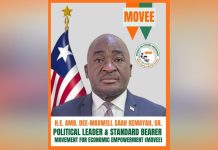Africa-Press – Liberia. According to Dr. Moniba, Liberia’s fiscal space already exists but is being consumed by what he calls an “oversized and unsustainable” government structure.
The Unity Party-led Government made history when it submitted a draft national budget exceeding US$1 billion for the first time in Liberia’s 178-year history. The 2025 draft budget stands at US$1.2 billion.
While supporters describe the landmark budget as a sign of economic expansion, critics argue that the allocations fail to address the real needs of ordinary Liberians. One such critic is former presidential candidate Dr. Clarence Moniba, who is urging President Joseph N. Boakai to recall the draft budget, trim the size of government, and immediately increase civil servants’ minimum take-home pay to US$500.
According to Dr. Moniba, Liberia’s fiscal space already exists but is being consumed by what he calls an “oversized and unsustainable” government structure.
“Mr. President, the transformation of the lives of our people requires you as the leader to think of tomorrow,” Dr. Moniba said.
Moniba Wants Gov’t Reduced from 104 to 50 Institutions
Dr. Moniba argues that Liberia, with a population of just 5.2 million, does not need 104 ministries, agencies, and commissions. He believes a streamlined government — reduced to no more than 50 institutions — would save between US$300 million and US$400 million in goods, services, and overhead.
Such savings, he said, would allow the government to raise civil servants’ minimum salaries to US$500 and increase public sector investment from US$281.5 million to US$400 million.
“It is unacceptable that in 2025, over 40,000 civil servants earn below US$200,” he said. “This was never the purpose of the democratic principle — a government for the people, by the people. The democratic principle is not about political appointees and lawmakers eating first, second, and third, while civil servants and citizens suffer.”
He added that the principle of democracy should not mean a government sustained by the “sweat and blood” of ordinary citizens to fund the salaries and benefits of top officials while hospitals remain under-equipped, schools lack materials, and communities face poor service delivery.
Recurrent Expenditures Consuming the Budget
Dr. Moniba pointed to the 2025 draft budget as evidence of a system weighed down by bureaucracy. Of the US$1.2 billion, he noted, US$929.6 million is allocated to recurrent expenditure — with nearly US$200 million earmarked for goods and services across the 104 government institutions.
Even the US$329 million assigned to employee compensation, he said, is heavily skewed in favor of senior officials.
“Seventy percent of the compensation line goes to ministers, deputies, commissioners, heads of agencies, advisers, and senior staff,” he said. “Meanwhile, over 60% of civil servants earn less than US$200 a month, from which they must pay rent and support their families.”
“So I again speak directly to President Boakai: when government operations consume so much of the national budget, the government is simply too big to succeed.”
Moniba said the time has come for the government to implement a comprehensive restructuring process that eliminates redundant positions, consolidates overlapping agencies, and channels saved resources toward the welfare of civil servants, teachers, health workers, and security personnel.
“Liberia does not have a revenue problem; Liberia has a spending problem,” he said. “If we cut unnecessary appointments and redirect those funds, we can pay our civil servants a dignified wage.”
He maintained that a minimum of US$500 for civil servants would not only improve living standards but also strengthen accountability, reduce corruption temptations, and enhance productivity across ministries and agencies.
President Boakai, who campaigned on rescuing Liberia from mismanagement and economic decline, has repeatedly promised to strengthen the civil service and create a professional workforce aligned with national priorities. However, critics argue that the administration has added dozens of new positions and made several political appointments that have expanded the wage bill.
Moniba’s statement adds to a growing chorus of voices urging the government to prioritize civil servants’ welfare, reduce bureaucracy, and realign spending with national development goals.
‘Save US$40–50 Million’
As part of his reform proposal, Dr. Moniba outlined several major consolidations he believes would reduce waste and strengthen governance.
Establish a Ministry of Natural Resources
He proposes merging the Ministry of Mines and Energy with functions currently performed by the National Oil Company of Liberia (NOCAL), the Forestry Development Authority (FDA), and the Liberia Petroleum Regulatory Authority (LPRA).
He argues this would remove duplicative regulatory structures and reinforce oversight of Liberia’s natural resources.
He called for the Ministry of Agriculture to be transformed into the Ministry of Food Security.
Under this model, agencies such as CARI, the Produce Marketing Corporation, the Fisheries Authority, the Cooperative Development Agency, national seed programs, and food safety units would fall under one umbrella.
Dr. Moniba says the consolidation would strengthen agriculture, promote value-added processing, reduce food imports, and ensure national food security.
Abolish the Ministry of Internal Affairs
He proposes replacing it with a Commission on Local Government that will fully implement the Local Government Act and bring decision-making closer to counties and districts.
He called for the merger of the Ministry of Posts & Telecommunications and the Liberia Telecommunications Corporation. These would be replaced by a National Digital Service Commission, responsible for government digital infrastructure, cybersecurity, and the implementation of a unified e-government platform, he said.
He believes this unified digital body would improve technology planning, strengthen government services, and reduce fragmentation.
“These are just three of many examples of cost-cutting measures that could change the fate of our nation,” he said.
Dr. Moniba stressed that the government must not continue to consume the resources intended for citizens’ well-being.
“No government can succeed when it consumes the very resources meant for its own people,” he said. “Reduce the size, raise the wages, and Liberia will be allowed to move forward.”
Looking Ahead
As Liberia approaches the midpoint of the Boakai administration, pressure is mounting for more aggressive reforms to restore confidence in the public sector.
Dr. Moniba emphasized that his call is not political but a patriotic appeal for fairness: “This is about dignity. It is about respecting the people who keep the government running every day.”
For More News And Analysis About Liberia Follow Africa-Press






